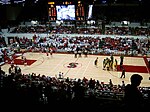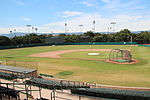Stanford Graduate School of Business
1925 establishments in CaliforniaBusiness schools in CaliforniaEducational institutions established in 1925Stanford University schoolsUse mdy dates from April 2013 ... and 1 more
Vague or ambiguous time from June 2019
The Stanford Graduate School of Business (also known as Stanford GSB or the GSB) is the graduate business school of Stanford University. Located in Stanford, California, for several years it has been the most selective business school in the world, admitting only about 6% of applicants.Stanford GSB offers a general management Master of Business Administration (MBA) degree, the MSx Program (MS in Management for mid-career executives) and a PhD program, along with joint degrees with other schools at Stanford including Earth Sciences, Education, Engineering, Law and Medicine. The GSB also offers Stanford LEAD Business Program, an online professional certificate program.
Excerpt from the Wikipedia article Stanford Graduate School of Business (License: CC BY-SA 3.0, Authors).Stanford Graduate School of Business
Knight Way,
Geographical coordinates (GPS) Address Nearby Places Show on map
Geographical coordinates (GPS)
| Latitude | Longitude |
|---|---|
| N 37.428 ° | E -122.1612 ° |
Address
Faculty Building East
Knight Way 655
94305
California, United States
Open on Google Maps







